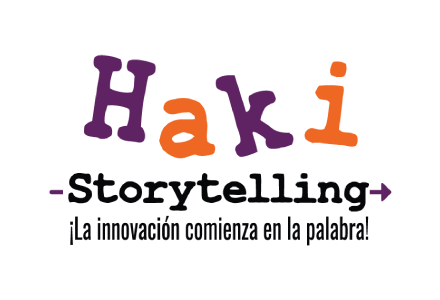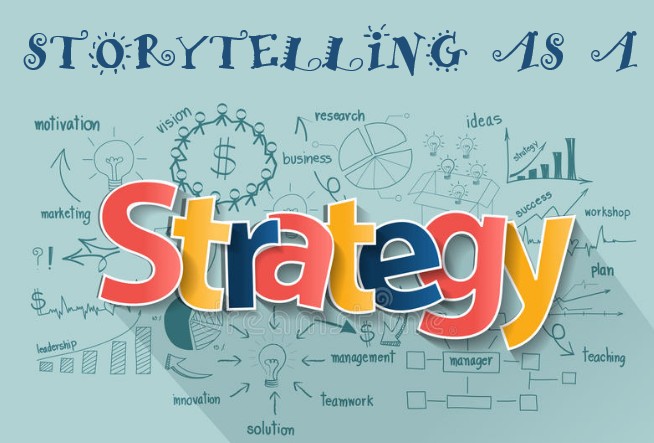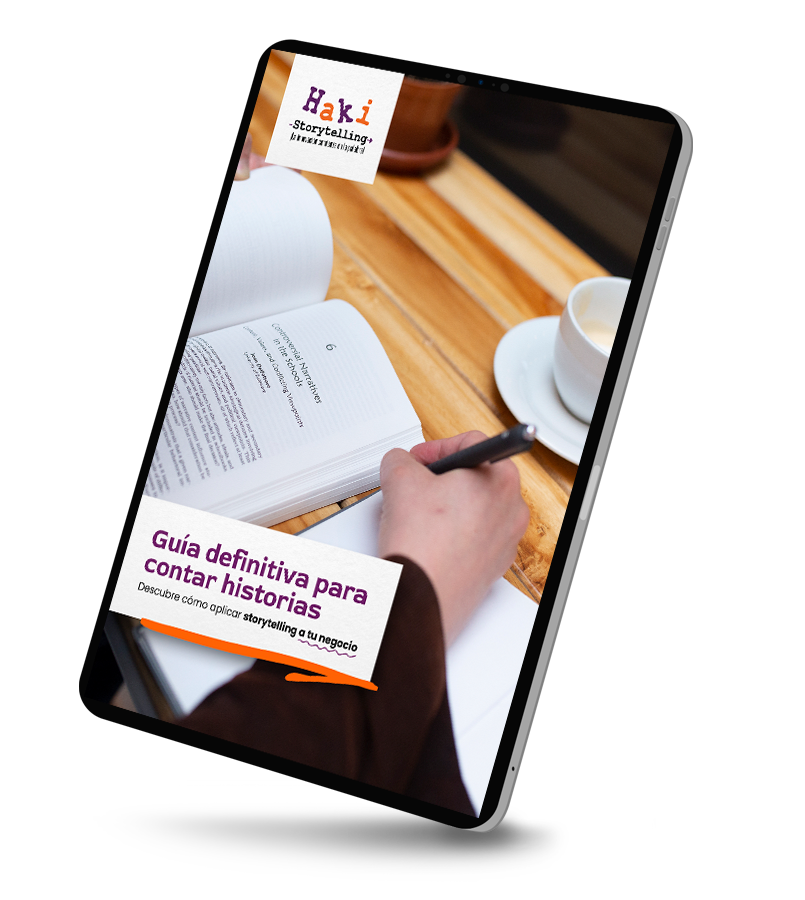Una de las ventajas del Storytelling, a cualquier nivel: el del día a día, el utilizado en educación, los negocios, etc. es la posibilidad de establecer una conexión a nivel humano. Ese es uno de mis objetivos principales de Haki Storytelling, y me encanta cuando encuentro empresas con una visión similar, una de ellas es Storytegic.
Hace un par de días me puse en la tarea de contactar a diferentes storytellers para ver si estarían interesados en ser escritores invitados y, para mi gran sorpresa, Amy Selwyn respondió mi mensaje.
Luego de trabajar por más de 20 años con grandes organizaciones como Bankers Trust, Salomon Brothers, The New York Times, The Associated Press and the British Broadcasting Corporation (BBC), Selwyn fue consultora de medios por 7 años y luego, en el 2012, fundó Storytegic, una pequeña (pero poderosa…) agencia exclusiva de marca, con sedes en Portland, Maine y Ámsterdam, Holanda.
Su formación académica abarca desde las Artes y la psicología hasta el mercadeo y administración de empresas. Es artística en todo el sentido de la palabra y está encantada de estar viva y coleando, en un tiempo en el que el poder de las historias finalmente está siendo reconocido y celebrado. Le encantan las palabras, las fotos, las marionetas, el teatro, las películas, la música y la danza, entre otras cosas, incluidos los pantalones tipo Harem, estos últimos en teoría, pero tal vez no en la práctica. Es la madre-humana de un descarado bulldog de tres años llamado Flecha, el miembro más asombroso de la casa y también el más bajito.
En su pieza, Selwin nos habla de la importancia de las historias y como el storytelling nos sirve como estrategia al momento de contar nuestra historia de marca. Si quieren saber más sobre ella y su trabajo, pueden visitar su página web.
STORYTELLING COMO ESTRATEGIA
Una historia de marca es estrategia de negocios. Si vives una gran historia de marca tendrás éxito, pero si fallas en vivirla o si fallas en tener una, estás frito.
Tal vez necesites que te convenza un poco…
Empecemos con esto. ¿Por qué los padres y maestros comienzan con “había una vez?”, ¿Por qué la enseñanza casi siempre comienza con una historia?, ¿La serie de libros de Dick, Jane y Spot, o Winnie y Piglet, Batman y Robin? Elige tu referencia cultural.
El aprendizaje comienza con historias porque, como los expertos sobre el cerebro lo han demostrado, son una manera increíblemente efectiva para que el cerebro transmita información importante y valores de un individuo, o de una comunidad, al otro(a). Las historias personales y emocionalmente irresistibles involucran más al cerebro; son recordadas de manera más clara, con más detalle y mayor significado que una lista de hechos.
Las historias capturan y mantienen nuestra atención. Aún más importante, esas historias hacen que nos relacionemos emocionalmente y nos sintamos identificados con los personajes. Comenzamos a participar en el viaje del héroe. Lo alentamos a él o ella. Nos ubicamos justo ahí —en la línea de fuego o colgando de un precipicio, o a punto de que ese apuesto, pero no buen pretendiente, nos deje.
Los narratologos denominan “transportación” a ese fenómeno. Lo experimentamos cuando nuestras palmas sudan y nuestro corazón late fuerte, mientras James Bond pelea con un villano encaramado en un tren que va a toda velocidad.
Las mejores historias no tratan sobre quien las cuenta (La marca), sino acerca del que las escucha (El cliente). El oyente se relaciona con la historia y entiende como la lucha y el desafío (y la inspiración), se relacionan con su vida.
Ahora relacionemos esto con la marca.
Los consumidores tienen opciones. Esto es cierto para los negocios B2C y B2B. El cliente toma una decisión acerca de qué producto o servicio va a comprar basado en un conjunto de criterios. Cosas importantes para él, cosas que le importan profundamente (a menos, claro está, que estemos hablando de un producto genérico, en cuyo caso el criterio, casi siempre, es el precio: Entre más barato mejor. Los productos genéricos no cuentan con historias de marca).
Cada vez más, la historia de marca se está convirtiendo en un factor crítico al momento de tomar la decisión de compra especialmente con los millennials, la generación más grande de la historia. Un estudio reciente muestra que el 85% de los millennials, correlacionan sus decisiones de compra y su voluntad para recomendar una marca, con los buenos esfuerzos sociales que la compañía haga.
Más allá, la historia de marca influencia la habilidad de una organización para atraer y retener a sus empleados. Un estudio realizado por Deloitte indica que el 50% de los millennials encuestados, quiere trabajar para una compañía con prácticas éticas. Esas mismas prácticas hacen parte de la historia de marca.
Piensen sobre ello. ¿Para quién les gustaría trabajar, una marca como Patagonia que se preocupa por el medio ambiente y crea oportunidades para que sus empleados creen cambios positivos en el planeta, o una empresa, por ejemplo, que no esté dispuesta a aceptar la responsabilidad de sus socios de la cadena de suministro y sus respectivas prácticas en el lugar de trabajo?
Otro beneficio clave para la historia de marca claramente articulada y entendida, es la participación de los empleados. Un estudio realizado por Cushman & Wakefield muestra que el 95% de los Millennials encuestados, correlacionaron la misión de la compañía con productividad: “Yo trabajo más fuerte, cuando entiendo cómo mi trabajo contribuye a la misión de la compañía” dijo uno de los entrevistados.
La historia de marca es una herramienta de negocios increíblemente poderosa. La historia de marca puede (y debe) contarle a tus clientes y prospectos:
Quién eres
Como te convertiste en un negocio, en una marca …y por qué.
Quién trabaja para ti y por qué.
Qué defiendes y representas.
Con qué sueñas.
Qué te hace diferente del resto.
Qué haces por el mundo que realmente importe
Cómo trabajas.
Que aprecias queridamente.
Cuál es el código ético que aplicas a cuestiones como: suministro de materia prima, cadena de suministro, etc.
Qué esperas (demandas) de tus proveedores y colegas.
Cómo tratas a la gente que trabaja contigo.
Tu filosofía de vida.
Estas son las preguntas que se responden cuando escribes y compartes tu historia de marca.
Ahora, aquí está el truco: Debes contar una historia sincera. ¿Qué pasa si algo ocurre con tu marca, algo que deseas arreglar, o algo que estás en proceso de cambiar? Eso está bien, dilo. Se como Chipotle, la empresa de comida rápida con integridad, que se atrevió a admitir que usaban ingredientes que contenían organismos genéticamente modificados (OGMs). Chipotle confesó, y luego se comprometió a que el porcentaje de OGMs fuera tan cercano al 0%, en un lapso de tres años. También comenzó a etiquetar sus menús, para mostrar que productos contenían ingredientes OGM, dándole al cliente la información necesaria para tomar una decisión.
¿Pensamos que Chipotle habría preferido dejar el asunto de los OGMs fuera de la historia? Claro. Pero entonces no habría sido autentica. Y tampoco le habría dado a la marca la oportunidad de establecer esa gran meta del 0% en tres años, que responsabiliza a la empresa y dice mucho acerca de la marca y lo que representa.
¿Cuál es tu historia de marca?, ¿la estás contando? ¿Estás compartiendo con los clientes qué es eso a lo que le apuestas y por qué estás aquí?, y. ¿cómo sería el mundo si tu marca no estuviera en el firmamento empresarial?
Con una historia de marca haces que tu marca sea memorable e involucras al cliente—haces un llamado para que se una a tu aventura, que responda tu llamado a la acción, a que haga parte de tu comunidad—conectándose a un nivel emocional, más que puramente intelectual en el que solo enumeras características del producto.
La historia de marca es poderosa porque invita a cada marca y cada persona que trabaja para esa marca a ponerse de pie y ser lo mejor que él o ella puedan ser. Demanda que defendamos algo. Requiere que tengamos significado más allá del beneficio económico.
Amy Selwyn
Co-founder, Storytegic
***
STORYTELLING AS STRATEGY
One of the advantages of Storytelling, at any level: the one we use to relate with other people, educational, business storytelling, etc. is the possibility that gives us of establishing a human connection. That’s one of the main objectives of Haki Storytelling, so I love when I find businesses with a similar vision; one of those is Storytegic.
Some days ago, I put myself in the task of contacting different storytellers, to see if they would be interested in being guest Writers in the Haki Blog, and for my great surprise, Amy Selwyn replied my message.
After working for more than 20 years with big organizations like Bankers Trust, Salomon Brothers, The New York Times, The Associated Press and the British Broadcasting Corporation (BBC), Selwyn became media consultant for seven years and then, in 2012, along with a colleague, decided to set up Storytegic a very small (but mighty…) boutique brand agency, with offices in Portland, Maine, and Amsterdam, The Netherlands.
Her academic training goes from Psychology and Arts to Marketing and business administration. She’s artsy, through and through, and is thrilled to be alive and kicking during a time when the power of story is finally being recognized and celebrated. She loves words, photos, puppets, theater, film, music, dance, Amongst other things like Harem pants, the latter in theory, but maybe not so much in real life…! She’s the human parent to a sassy 3-year old French bulldog named Arrow. The awesomest member of her household, and also the shortest.
In her piece, Selwyn talks about the importance of stories and how storytelling serves as Strategy when it comes to telling a Brand Story. If you want to learn more about her and her work, you can visit her company website.
STORYTELLING AS STRATEGY
Brand story is business strategy. Live a great brand story and you’ll succeed. Fail to live it or fail to have a great brand story? You are toast.
Maybe you need some convincing…
Start with this. Why do parents and teachers start with “Once upon a time”? Why does learning almost always begin with a story? Dick and Jane and Spot, maybe, or Winnie and Piglet, or Batman and Robin? Choose your cultural reference.
Learning starts with stories because, as brain experts have proven, stories are an incredibly effective way for the brain to transmit important information and values from one individual or community to the next. Stories that are personal and emotionally compelling engage more of the brain. They are remembered more clearly and with greater detail and (ding ding ding) with greater meaning than a list of facts.
Stories capture and hold our attention. And, even more important, stories that sustain our attention cause us to relate emotionally and empathize with the characters. We start to participate in the hero’s journey. We cheer him or her on. We put ourselves right in there — in the line of fire or hanging from a cliff or about to be dumped by that good looking but seriously no good cad of a suitor.
Narratologists call this phenomenon “transportation.” We experience this when our palms sweat and our hearts pound as James Bond dukes it out with a villain atop a speeding train.
The best stories become not about the teller (brand) but about the listener (customer). The listener relates to the story and understands how the struggle and the challenge (and the inspiration) relate to her own life.
Now let’s bring this back to brand.
Consumers have choices. This is true of B2C and B2B businesses. The customer makes a choice about which product or service to buy based on a set of criteria. Things that are important to him. Things that matter deeply to her. (Unless, of course, you’re talking about a commodity, in which case the criteria is almost always price. The cheaper the better. Commodities do not have brand stories.)
Increasingly, the brand’s story is becoming a critical part of the buying decision, especially with millennials, the largest generation in history. A recent study shows that 85 percent of millennials correlate their purchasing decisions and their willingness to recommend a brand to the social good efforts a company is making.
Further, brand story influences an organizations’s ability to attract and retain a great staff. A study by Deloitte indicates that 50% of millennials surveyed want to work for a business with ethical practices. Those very practices are part of the brand story.
Think about it. Which would you rather work for — a great brand like Patagonia that cares about the environment and creates opportunities for its employees to create positive change for the planet, or a business with unwillingness to accept responsibility for its supply chain partners and their respective workplace practices?
Another key benefit to the clearly articulated and understood brand story is employee engagement. A study by Cushman and Wakefield shows that 95% of millennials interviewed correlated company mission with productivity. “I work harder when I understand how my work contributes to the company’s mission,” one interviewee was quoted as saying.
Brand story is an incredibly powerful business tool. Your brand story can (and should) tell your customers and your potential customers:
Who you are
How you came into being as a business, as a brand…and why
Who works for you and why
What you stand for
What you dream of
What makes you different from everyone else
What you do for the world that really matters
How you work
What you hold dear
What ethical code you apply to things like raw material sourcing, supply chain, etc.
What you expect (demand) from your suppliers and partners
How you treat the people who work for you
Your philosophy on life
These are the questions that get answered when you write and share your brand story.
Now, here’s the catch: You have to tell a truthful story! What if there’s something going on with your brand that you would like to fix? Or something that you’re in the process of changing? That’s okay. Say it. Be like Chipotle, the fast food company with integrity who dared to admit it was using some ingredients containing Genetically Modified Organisms (GMOs).Chipotle ‘fessed up. And then it committed to getting the GMO percentage as close to zero percent as possible over the next three years. It also started labeling its menus to show which items contained GMO ingredients, giving the customer information with which to make a choice.
Do we think Chipotle would have preferred to leave the GMO thing outta the story? Of course. But then it wouldn’t have been true. Authentic. And it would also not have given the brand the opportunity to set out a big-ass goal of zero percent in three years, which holds the company accountable and speaks volumes for the brand and who it is.
What is your brand story? Are you telling it? Are you sharing with your customers just what it is you stand for and why you’re here and what the world would be like if your brand were not in the Milky Way?
With your brand story, you make your brand memorable. And you invite the customer in — you call them in to join your adventure, to respond to your call to action, to be part of your community — connecting at an emotional rather than a purely intellectual level where you list product features.
Brand story is powerful because it calls upon each brand and each person who works for that brand to stand up and be the best he or she can be. It demands that we stand for something. It requires us to have meaning beyond profit.
Amy Selwyn
Co-founder, Storytegic.






